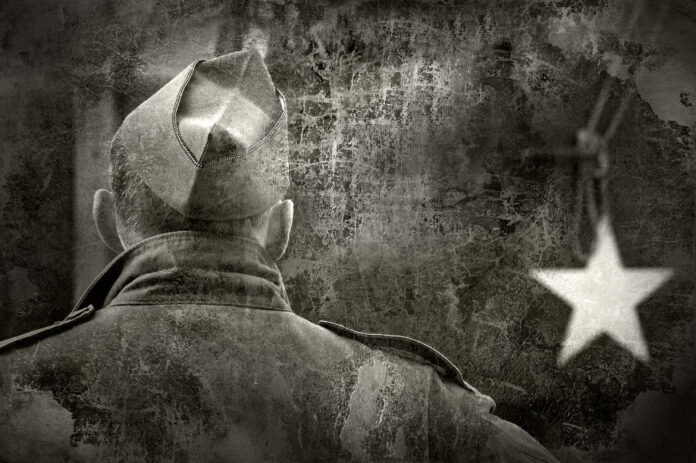During World War II, approximately 500,000 American Jews served in various branches of the United States armed services.
My mother’s brother Moish was one of them. He was learning in Baltimore’s Yeshivas Ner Yisroel, but when the US joined the war, he felt compelled to join the military effort to help defeat Hitler, ym”s.
He served in the South Pacific and, though he never spoke of it, I learned after his death in 2002 that he had been on a ship that was torpedoed by the Japanese and had survived by holding onto a piece of flotsam for many hours. He lived his postwar life quietly, a frum Jew and proprietor of a Jewish bookstore.
Many other American Jews, religious and otherwise (at least when not in foxholes) served in the war’s European theater.
One was Sergeant Lester Tanner (originally Tannenbaum). Another was a medic named Paul Stern. They both recounted an astonishing act of their Master Sergeant, a non-Jewish man named Roddie Edmonds.
Sergeant Edmonds’ son Chris, today a retired Baptist pastor in Tennessee, had been unaware of it. Like my uncle and so many other self-effacing veterans, his father preferred not to speak about his war experiences.
But the sergeant’s son, in the course of helping his daughters with a school history project in 2013, nearly 30 years after his father’s death, entered his name into a search engine. When he clicked on an article in the results and read it, he discovered something that made his father, whom he had always thought of as his personal hero, a hero by anyone’s standard.
It was a 2008 New York Times piece that had to do with Mr. Tanner, who had become a lawyer after the war. As a G.I. back in 1945, though, the article noted, he and more than 1,000 other American servicemen were taken prisoner by the Germans and held in the Ziegenhein stalag.
As the highest-ranking American soldier in the group, Sergeant Roddie Edmonds was responsible for the camp’s American POWs.
Soon after their arrival, in January 1945, the camp’s commandant, a man named Siegmann, ordered Sergeant Edmonds to identify and separate the Jewish soldiers from the other captives.
At the appointed time to present the Jews, Sergeant Edmonds ordered all of the POWs to stand in formation outside their barracks. He stood with his men, flanked by Sergeant Tanner and medic Stern.
When the Nazi saw all the men standing in formation, he said, “They cannot all be Jews.”
Sergeant Edmonds’ response was: “We are all Jews here.”
The commandant then placed his pistol against Sergeant Edmonds’ head and again demanded that he identify the Jewish soldiers or be killed.
He responded: “The Geneva Convention states that if a soldier is captured he need only provide his name, rank and serial number. If you shoot me, you will have to shoot all of us, because we all know who you are, and when the war is over you will be tried as a war criminal.”
The German commandant turned around and left.
Roddie Edmonds, at the risk of his life, single-handedly saved the lives of 200 Jewish soldiers.
Later, when the Germans were retreating and the POWs in the camp were ordered to accompany them, Sergeant Edmonds instructed his men to refuse, which they did. Their fellow American soldiers arrived to liberate them on March 30, 1945, the second day of Pesach.
Sergeant Edmonds, who went on to fight in the Korean War, is the only US serviceman to have been inducted by Yad Vashem as one of the “Righteous Among the Nations.”
The ceremony took place in 2016 at the Israeli Embassy in Washington. Then-President Obama attended and said: “We are all Jews, because anti-Semitism is a distillation, an expression of an evil that runs through so much of human history, and if we do not answer that, we do not answer any other form of evil.”
Last Tuesday, a collection of Jewish communal groups hosted Sergeant Edmonds’ son Chris at an event honoring Jewish war veterans.
He said that the knowledge that there are literally thousands of descendants of those 200 Jewish soldiers whom his father saved was his “biggest joy.”





















